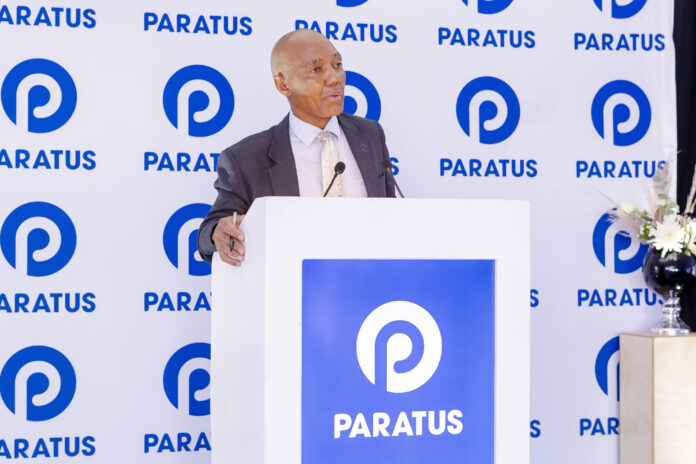29th May 2024
Own Correspondent
The Deputy Permanent Secretary of the Botswana Ministry of Communications, Knowledge and Technology, Cecil Masiga said that the recently launched Botswana Kalahari Fiber route (BKF) is a triumph for the people of Botswana and for the country’s economy.
He was speaking at an event held at Paratus Botswana Head Office in Gaborone, to officially mark the opening of the BKF route. This after Paratus Botswana announced it had completed the last leg of the new Botswana Kalahari Fiber (BKF) route.
Deputy Permanent Secretary of the Communications Ministry, Cecil Masiga said “The launch of the Botswana Kalahari Fiber (BKF) route by Paratus Botswana is not just a testament to the power of innovation but also a pivotal step towards achieving our national goals as outlined in Vision 2036. In today’s fast-paced world, reliable and high-speed internet connectivity is not a luxury but a necessity.”
He said, “It is the backbone of modern economies, a vital tool for businesses, and an essential service for our communities. The strategic endeavour by Paratus Botswana to lay an 840-kilometer fiber route from Gaborone all the way to the Namibian border, is a ground-breaking project that promises to revolutionize our digital landscape.”
A total of 840 kms of fiber was laid between the Namibian border and Lobatse and was activated last month. Representing an investment of approximately BWP 70 million in Botswana, the BKF is the largest significant investment in its own infrastructure by Paratus Botswana to date.
The BKF completes the last leg of the Paratus built Trans Kalahari Fiber (TKF) route which runs from Johannesburg to Swakopmund in Namibia. The new route creates the lowest latency primary transit path through Botswana and Namibia to Europe. The new BKF will connect Botswana and neighbouring countries to various international subsea cables, and to the rest of the world.
Managing Director of Paratus Botswana, Shawn Bruwer said: “The completion of this fiber route is yet another integral intervention in our commitment to provide the highest quality network services and to the Paratus Group’s overall vision to transform Africa through exceptional digital infrastructure and customer service.”
Paratus Botswana and Paratus Namibia have worked closely together in the bid to connect South Africa to the Equiano cable in Swakopmund. By connecting to Equiano in Namibia, the BKF route will assist in enabling more product options and will help stimulate economic growth.
According to the economic impact assessment conducted by Africa Practice and Genesis Analytics, commissioned by Google, Equiano is forecast to more than double internet speeds and increase internet penetration by 7.5% in the next three years alone, while acting as a catalyst for considerable growth, job creation and sustainability in both Namibia and the whole region.
The news comes a few months after Paratus announced the launch of its Gaborone metro fiber ring and, as Country MD of Paratus Botswana, Shawn Bruwer says: “The Botswana Kalahari Fiber Route is part of our ongoing investment in our network infrastructure to meet the growing demand for telecommunications services in the country. The Paratus quality network services offering is now even more compelling, particularly for the financial services and banking sectors or indeed any industry sector that needs to have an independent, reliable, and fully resilient connection all the time.”
This section of the Botswana Kalahari Fiber route has taken around 18-months to complete, and involved building infrastructure that includes 15 000 gum poles and 10,368 splices on 216 termination joints. It was built entirely by local Botswana contractors and, indirectly, created around 100 jobs.
The new route runs from Lobatse and Tlokweng borders, via Gaborone, Molepolole and Letlhakeng, and then from Kang through to Charles Hill and the border into Namibia. This will connect Botswana to the new 144 Terabit Equiano subsea cable, for which the Paratus Group built the landing station in 2022, and which will provide even faster, reliable connections and more diverse routes and redundancy across the region.









